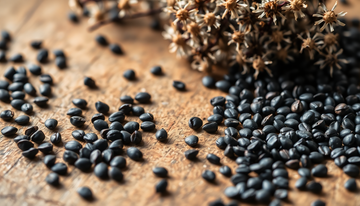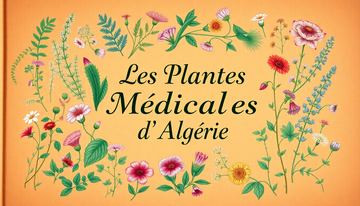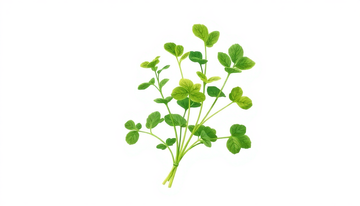Nigella, the small black seed with numerous benefits, has held a significant place in Algerian culture and tradition for centuries. Known as "sanouj" in Arabic, this plant with remarkable medicinal properties has transcended time to become an essential element of Algeria's heritage.
Origins and History of Nigella in Algeria
Native to the Middle East, nigella (Nigella sativa) was introduced to Algeria hundreds of years ago. Since then, it has become deeply rooted in the country's traditions and popular medicine practices. Ancient Algerians quickly recognized the healing virtues of this seed and incorporated it into their traditional pharmacopeia.
In Algerian culture, nigella is associated with many beliefs and symbols. It is considered a blessed plant, capable of protecting against the evil eye and bringing prosperity. Nigella seeds are often used in rituals and ceremonies, reflecting their spiritual significance.
Medicinal Properties of Nigella
Nigella is renowned for its numerous medicinal properties. Rich in active compounds such as thymoquinone, nigella has potent anti-inflammatory, antioxidant, and immune-stimulating properties.
In terms of health benefits, nigella has proven effective in treating various ailments. It is particularly used for:
Boosting the immune system
Nigella compounds stimulate the production of immune cells, helping to fight infections and prevent diseases.
Regulating diabetes
Studies have shown that nigella can help control blood glucose levels and improve insulin sensitivity.
Reducing inflammation
With its anti-inflammatory properties, nigella can relieve joint and muscle pain.
Improving digestion
Nigella seeds are known for their digestive virtues, helping to alleviate stomach aches, bloating, and constipation.
Caring for skin and hair
Nigella oil is used in many cosmetic treatments for its benefits on skin and hair.
Traditional Uses in Algeria
In traditional Algerian medicine, nigella is used in various forms to treat numerous health issues. The seeds are often ground into powder and mixed with honey, olive oil, or other ingredients to create homemade remedies.
Algerians also use nigella in their cuisine, adding it to traditional dishes like couscous, stews, and bread. The seeds are also consumed as a condiment or dietary supplement.
Beyond its medicinal and culinary uses, nigella plays a significant role in Algerian rituals and traditions. It is often used in purification, protection, and blessing practices.
Nigella in the Algerian Economy
Today, nigella has become a key product in the Algerian economy. The country is one of the leading producers and exporters of this precious seed. Many local businesses specialize in processing and marketing nigella in the form of oils, dietary supplements, and cosmetic products.
The growing interest in natural products and traditional remedies has also contributed to nigella's international popularity. Increasingly, consumers worldwide are discovering the benefits of this small black seed, making nigella a key element of Algeria's heritage and identity.
Conclusion
Nigella holds a unique place in Algerian culture and tradition. This plant with multiple virtues has endured through the centuries to become an indispensable part of the country's heritage. From medicinal uses to culinary applications, and rituals to beliefs, nigella is deeply embedded in Algerian identity.
Today, nigella is experiencing a resurgence of interest globally, thanks to its remarkable medicinal properties and cultural value. It represents not only a health treasure but also a symbol of the richness and diversity of Algerian culture.






